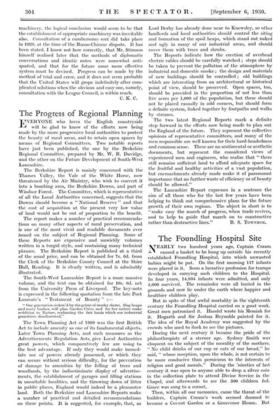The Progress of Regional Planning E VERYONE who loves the English
countryside will be glad to know of the efforts now being made by the more progressive local authorities to protect the beauty of rural areas, and to retain open spaces by means of Regional Committees. Two notable reports have just been published, the one by the Berkshire Regional Committee, prepared by Mr. W. R. Davidge, and the other on the Future Development of South-West Lancashire.
The Berkshire Report is mainly concerned with the Thames Valley, the Vale of the White Horse, now threatened by the Air Ministry, who wish to convert it into a bombing area, the Berkshire Downs, and part of Windsor Forest. The Committee, which is representative of all the Local Authorities concerned, suggests that the Downs should become a "National Reserve" and that the cost of acquisition at the present very low value of land would not be out of proportion to the benefit.
The report makes a number of practical recommenda- tions on many other aspects of rural preservation, and is one of the most vivid and readable documents ever issued on the subject of Regional Planning. Some of these Reports are expensive and unwieldy volumes written in a turgid style, and containing many technical phrases. The Berkshire Report is published at a third of the usual price, and can be obtained for 7s. 6d. from the Clerk of the Berkshire County Council at the Shire Hall, Reading. It is clearly written, and is admirably illustrated.
The South-West Lancashire Report is a more massive volume, and the text can be obtained for 105. 6d. net from the University Press of Liverpool. The key-note is expressed in the following quotation from the late Poet Laureate's "Testament of Beauty" :—
"Our generation sieken'd by the grime of murky slums, Slag heaps and sooty bushes, will plan Garden Cities and for her soilure make reddition to Nature, replanting the fair lands which our industrial grandsires disafforested: The Town Planning Act of 1909 was the first British Act to include amenity as one of its fundamental objects. Later Town Planning Acts, and such measures as the Advertisements Regulation Acts, give Local Authorities great powers, which comparatively few are using to the best advantage. If only they would make immed- iate use of powers already possessed, or which they can secure without serious difficulty, for the prevention of damage to amenities by the felling of trees and woodlands, by the indiscriminate display of advertise- ments, the establishment of garages and filling stations in unsuitable localities, and the throwing down of litter in public places, England would indeed be a pleasanter land. Both the Berkshire and Lancashire Reports make a number of practical and detailed recommendations on these points. It is suggested, for example, that, as
Lord Derby has already done near to Knowsley, so other landlords and local authorities should control the siting and formation of the spoil heaps, which stand Out .naked and ugly in many of our industrial areas, and should cover them with trees and shrubs.
The Reports indicate how the erection of overhead electric cables should be carefully watched ; steps should be taken to prevent the pollution of the atmosphere by industrial and domestic smoke ; the design and materials of new buildings should be controlled ; old buildings which are interesting from an architectural or historical point of view, should be preserved. Open spaces, too, should be provided in the proportion of not less than five acres per 1,000 of the population, but these should not be placed casually in odd corners, but should form a definite system, linked together by footpaths and walks by streams.
The two latest Regional Reports mark a definite step forward in the efforts now being made to plan out the England of the future. They represent the collective opinions of representative committees, and many of the men responsible are well known for their hard-headedness and common sense. These are no sentimental or aesthetic documents, but represent the considered views of experienced men and engineers, who realise that "there still remains sufficient land to afford adequate space for the fruitful and healthy activities of a vast population, but encroachments already made make it of paramount importance that no further waste of efficiency or of beauty should be allowed."
The Lancashire Report expresses in a sentence the aim of all those who for the last few years have been helping to think out comprehensive plans for the future growth of their own regions. The object in short is to "make easy the march of progress, when trade revives, and to help to guide that march on to constructive rather than destructive lines." B. S. TOWNII0E.






























 Previous page
Previous page